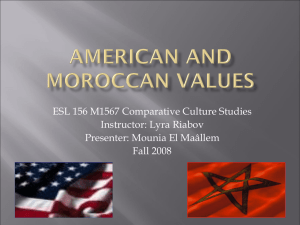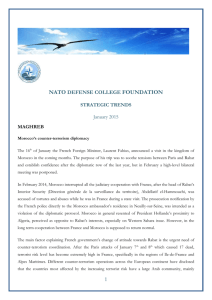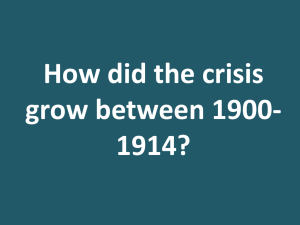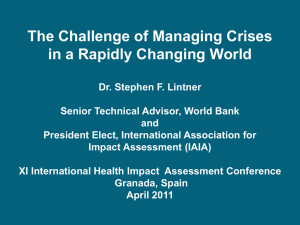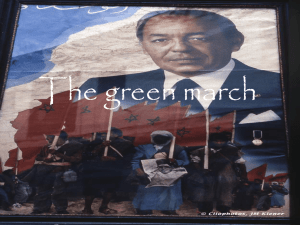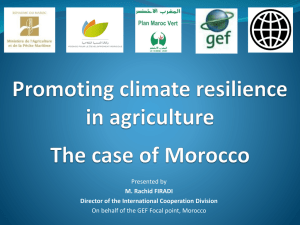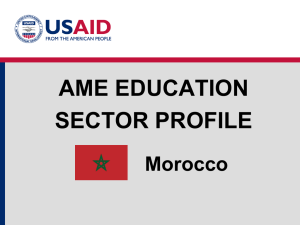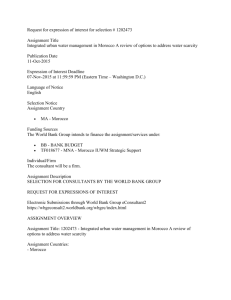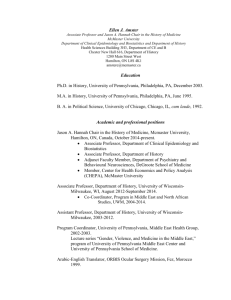France and the Maghreb - Institute of French Studies
advertisement
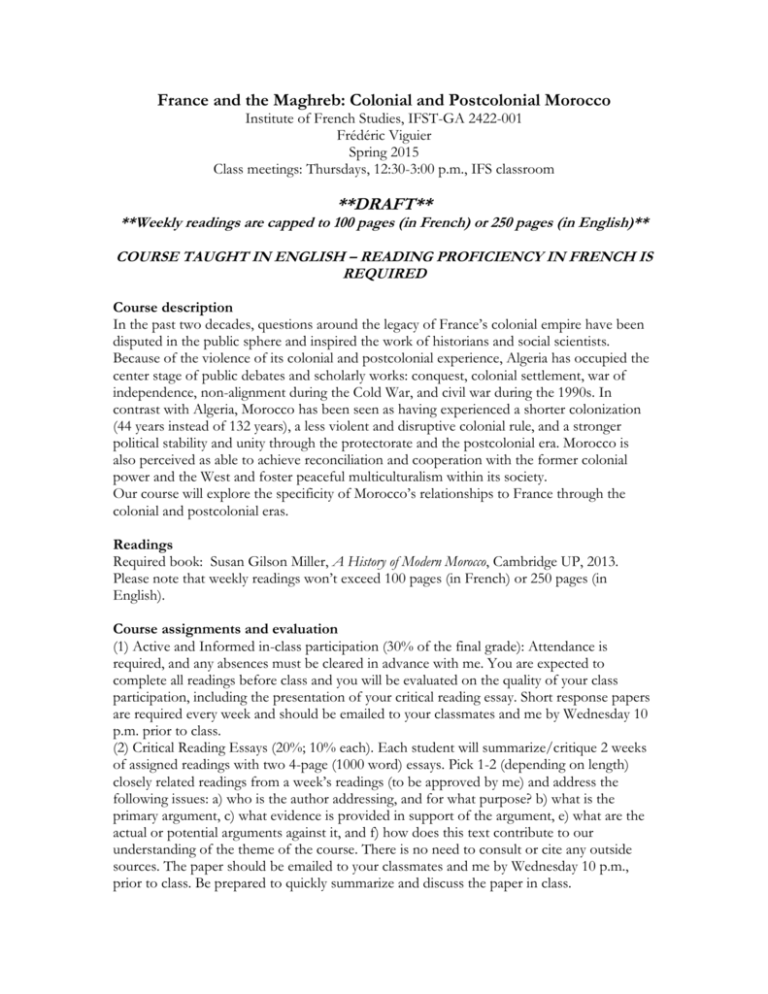
France and the Maghreb: Colonial and Postcolonial Morocco Institute of French Studies, IFST-GA 2422-001 Frédéric Viguier Spring 2015 Class meetings: Thursdays, 12:30-3:00 p.m., IFS classroom **DRAFT** **Weekly readings are capped to 100 pages (in French) or 250 pages (in English)** COURSE TAUGHT IN ENGLISH – READING PROFICIENCY IN FRENCH IS REQUIRED Course description In the past two decades, questions around the legacy of France’s colonial empire have been disputed in the public sphere and inspired the work of historians and social scientists. Because of the violence of its colonial and postcolonial experience, Algeria has occupied the center stage of public debates and scholarly works: conquest, colonial settlement, war of independence, non-alignment during the Cold War, and civil war during the 1990s. In contrast with Algeria, Morocco has been seen as having experienced a shorter colonization (44 years instead of 132 years), a less violent and disruptive colonial rule, and a stronger political stability and unity through the protectorate and the postcolonial era. Morocco is also perceived as able to achieve reconciliation and cooperation with the former colonial power and the West and foster peaceful multiculturalism within its society. Our course will explore the specificity of Morocco’s relationships to France through the colonial and postcolonial eras. Readings Required book: Susan Gilson Miller, A History of Modern Morocco, Cambridge UP, 2013. Please note that weekly readings won’t exceed 100 pages (in French) or 250 pages (in English). Course assignments and evaluation (1) Active and Informed in-class participation (30% of the final grade): Attendance is required, and any absences must be cleared in advance with me. You are expected to complete all readings before class and you will be evaluated on the quality of your class participation, including the presentation of your critical reading essay. Short response papers are required every week and should be emailed to your classmates and me by Wednesday 10 p.m. prior to class. (2) Critical Reading Essays (20%; 10% each). Each student will summarize/critique 2 weeks of assigned readings with two 4-page (1000 word) essays. Pick 1-2 (depending on length) closely related readings from a week’s readings (to be approved by me) and address the following issues: a) who is the author addressing, and for what purpose? b) what is the primary argument, c) what evidence is provided in support of the argument, e) what are the actual or potential arguments against it, and f) how does this text contribute to our understanding of the theme of the course. There is no need to consult or cite any outside sources. The paper should be emailed to your classmates and me by Wednesday 10 p.m., prior to class. Be prepared to quickly summarize and discuss the paper in class. (3) Final Paper (50%). The paper topic must be approved in advance by me. 1. January 29. Introduction and historical landmarks Charles Robert Ageron et Marc Michel (dir.), L’Afrique noire française : l’heure des indépendances, Paris, CNRS Editions, 1992, - Philippe Ardant, « Le néo-colonialisme : thème, mythe et réalité », Revue française de science politique, vol. XV, octobre 1965, no5, p. 837-855. - Bertrand Badie, Marie-Claude Smouts, Le retournement du monde : sociologie de la scène internationale, Paris, Presses de la FNSP, 1995. - Frédéric Charillon (dir) Politique étrangère. Nouveaux regards, Paris, Presses de Sciences Po, 2002. - Susan Gilson Miller, A History of Modern Morocco, Cambridge UP, 2013. chapters 1&2 2. February 5. Pre-colonial Morocco - Abdallah Laroui, L'histoire du Maghreb. Un essai de synthèse, Maspero, 1970 (« L'équilibre de la décadence », p. 211- 267). - Susan Gilson Miller, A History of Modern Morocco, Cambridge UP, 2013. chapters 1&2 3. February 12. Colonial conquest and indigenous resistance - Vincent Courcelle-Labrousse et Nicolas Marmié, La guerre du Rif, Tallandier, 2009. - Susan Gilson Miller, A History of Modern Morocco, Cambridge UP, 2013. - AbdelKrim, une mémoire interdite, audio documentary by Raphaël Krafft and Charlotte Roux - Daniel Rivet, Lyautey et l'institution du protectorat français au Maroc, t. 2., L'Harmattan, 1988, p.7-117. - Daniel Rivet, Le Maghreb à l'épreuve de la colonisation, Hachette-Littératures, 2002, p. 17-58. 4. February 19. Morocco and French imperial orientalism - Edmund Burke III, France and the Invention of Moroccan Islam, University of California Press, 2014. - Raoul Girardet, L’idée coloniale en France de 1871 à 1962, La Table Ronde, 1972, p. 3-135. - Pierre Singaravélou, Professer l’Empire, 2011. 5. February 26. What is a “Protectorate”? 1912-1956 - Susan Gilson Miller, A History of Modern Morocco, Cambridge UP, 2013. - Daniel Rivet, Le Maroc de Lyautey à Mohammed V. Le double visage du protectorat, Denoël, 1999, p. 19-84 et 120-156., - Mohammed Berrada, Le jeu de l'oubli, Actes-sud, 1994. A memoir by Driss Chraïbi, Lu, Vu, Entendu Or a novel by Dris Chraïbi, The Simple Past 6. March 5. The Colonial Experience and the Framing of Moroccan Nationalism Edmund Burke III, “Theorizing the Histories of Colonialism and Nationalism in the Arab Maghrib,” in Ali Abdullatif Ahmida (ed.), Beyond Colonialism and Nationalism in the Maghrib. History, Culture and Politics, Palgrave Macmillan, 2009 (1st ed.: 2010), p. 17-34. - Susan Gilson Miller, A History of Modern Morocco, Cambridge UP, 2013. - Daniel Rivet, Le Maroc de Lyautey à Mohammed V, p. 340-421. - Spencer D. Segall, The Moroccan Soul. French Education, Colonial Ethnology and Muslim Resistance, 1912-1956, University of Nebraska Press, 2009. - Jonathan Wyrtzen, “Performing the Nation in Anti-colonial Protest in Interwar Morocco,” in Nations and Nationalism, 2013. 7. March 12. The Endurance of French influence from pre-colonial to post-colonial Morocco 1: Technical and Educational Coopération - Etienne Gérard et Bernard Schlemmer, « Les travers du savoir. Représentations des diplômes au Maroc », Cahiers d’études africaines, 2003. - Julien Meimon, En quête de légitimité. Le Ministère de la Coopération, 1959-1999 Grazia Scarfo-Ghellab and Anne-Catherine Wagner, Le monde universitaire face au marché. Circulation des savoirs et pratiques des acteurs, 2011 - Pierre Vermeren, La formation des élites marocaines et tunisiennes. Des nationalistes aux islamistes, La Découverte, 2010. 8. March 26. The Endurance of French influence from colonial to post-colonial Morocco 2: Urban Planning - Jean-Louis Cohen and Monique Eleb, Casablanca : Colonial Myths and Architectural Ventures, Monacelli Press, 2002. - Michel Ecochard, Le roman de Casablanca, 1955. - Paul Rabinow, French Modern. Norms and Forms of the Social Environment, MIT Press, 1989. - Jean-Luc Pierre, Casablanca et la France. Mémoires croisées, XIXe-XXe siècles, Croisée des chemins, 2004. 9. April 2. Independent Morocco’s Foreign Policy - Nicolas Beau, Paris, capitale arabe, Seuil, 1995. - Samia Errazouki and Allison L. McManus, Beyond dominant Narratives of the Western Sahara, Jadamag Issue 1.2., 2013 - Richard B. Parker, North Africa. Regional Tensions and Strategic Concerns. - Benjamin Stora, Algérie, Maroc : Histoires parallèles, destins croisés, Zellige, 2002. - Pierre Vermeren, Histoire du Maroc depuis l’Indépendance, La Découverte, 2010. 10. April 9. « Notre ami le Roi » - Susan Gilson Miller, A History of Modern Morocco, Cambridge UP, 2013. - Gilles Perrault, Notre ami le Roi, Gallimard, 1990. - Stephen Smith, Oufkir, un destin marocain, Calmann-Lévy, 1999. - Susan Slyomovics, The Performance of Human Rights in Morocco, The University of Pennsylvania Press, 2005. 11. April 16. Islamism in Morocco: An Anti-colonial Second Wave? - François Burgat, L’islamisme au Maghreb, Karthala, 1988. - Léon Buskens, « Sharia and national law in Morocco », in Otto Jan Michiel (ed.), Sharia Incorporated. A Comparative Overview of the Legal Systems of Twelve Muslim Countries in Past and Present, 2010. - Malika Zeghal, Islamism in Morocco : Religion, Authoritarianism and Electoral Politics, Markus Wiener Publishers, 2008. 12. April 23. Moroccan Jews between three lands - Michel Abitbol, Le passé d'une discorde. Juifs et Arabes du VIIème siècle à nos jours, Perrin, 1999, p. 250-355. - Michael M. Laskier, The Alliance Israélite Universelle and the Jewish Communities of Morocco, 18621962 (Albany, 1983), p. 100-147. - Susan Gilson Miller, “The Mellah of Fez: Reflections on the Spatial Turn in Moroccan Jewish History,” in A. Nocke, J. Brauch, A. Lipphardt (eds.), Jewish Topographies; Visions of Space, Traditions of Place, London, Ashgate, 2008. - Norman A. Stillman, “Middle Eastern and North African Jewries Confront Modernity: Orientation, Disorientation, Reorientation”, in Harvey Goldberg (ed.), Sephardi and Middle Eastern Jewries. History and Culture in the Modern Era (Bloomington, 1996), p. 59-72. - Norman A. Stillman, The Jews of Arab Lands in Modern Times (Philadelphia, 1991), p. 3-26. Film: Marock by Laïla Marrakchi, 2005. 13. April 30. Women and gender in a post-colonial society - Fatima Mernessi, The Harem Within - Safâa Monqid, Femmes dans la ville. Rabat : de la tradition à la modernité urbaine, Rennes, PU Rennes, coll. « Géographie sociale », 2014 - Fatima Sadiqi, Women, Gender and Language in Morocco, (2003). Film: Rock the Casbah by Laila Marrakchi, 2013. 14. May 7. Remembering the Colonial Past in Contemporary Morocco - Driss Maghraoui, “The Moroccan Colonial Soldiers. Between Selective Memory and Collectiv Memory,” in Ali Abdullatif Ahmida (ed.), Beyond Colonialism and Nationalism in the Maghrib. History, Culture and Politics, Palgrave Macmillan, 2009 (1st ed., 2010), p. 49-70. CasaMémoire
